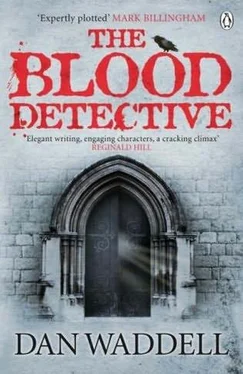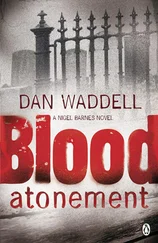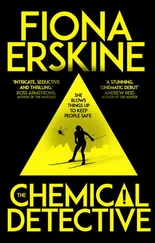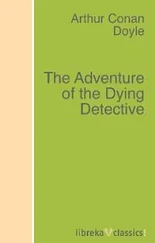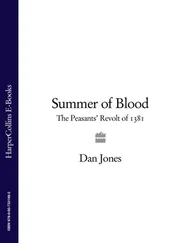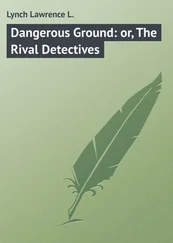While on the subject of my research, I think we both know the reason you asked for it. I have been reading the newspapers and have noticed a striking connection between the people you hired me to trace and those who have been victims of the serial killer in Notting Hill. It is not for me to judge how people use the information I provide them with. But, in this case, I think my concern is justified.
With that in mind, I think we should perhaps reconsider my fee and seek to increase it sizeably. "I have contacts with the police and national newspapers agencies who would both be interested in getting their hands on the information that I have provided you with. Confidentiality is sacrosanct in my business, and is one tenet to which I strictly adhere.
However, in this case, the circumstances are so extraordinary as to test that belief. The ball is in your court.
Sincerely,
Duckworth
Nigel shook his head, unable to believe that Duckworth had attempted to blackmail the killer before approaching the police.
Actually, he could. Presumably the killer knew that, too, and had picked his stooge carefully.
'We've found a post office box address to which he sent the documents. The owner is registered as a Mr Kellogg, 24 Leinster Gardens, W2. There's a team on the way there now.'
'Read me that address again,' Nigel said.
Drinkwater repeated it.
'Tell your team to turn back. That's a fake address.'
'How do you know that?' Drinkwater said abruptly.
'Because that's a fake house.'
'A fake house?'
'When they built the Circle Line, they had to demolish a whole load of houses on the route because it was built so near the surface. Most people were paid off and relocated, and their houses were then knocked down. The residents of Leinster Gardens were richer than some of their neighbours and had a bit more clout. They said, with some justification, that a railway track would ruin the line of the street.
The Metropolitan Company agreed to build a fake facade to disguise the fact that there was a big gap where numbers 23 and 24 had been.'
'Shit,' Heather said, with feeling. Then she asked, 'How have you got on tracing the Hogg bloodline?'
'I've found two living relatives.'
'Let's find them. Quick,' Heather said. 'At the moment they're all we've got, and we're running out of time.'
According to the electoral rolls, Karl Hogg's last known address was a purpose-built flat nestling at the western end of Oxford Gardens, a blossom-lined street of four-and five-storey Victorian mansions, most of them long since carved up into flats for young professionals.
Nigel and Heather sprinted up to the third floor of a red-brick block that was out of keeping with the stately atmosphere of the rest of the street. They knocked on Hogg's door. No answer. An elderly woman in a neighbouring flat was in. She confirmed that a Karl lived next door, but she knew him as Karl Keene. Two months ago he had taken away most of his furniture in a van, though he had returned a few times since. When she asked if he'd moved out, he said he was going away but would be around for the next few months.
'Did he say where his furniture was?' Heather asked.
She shook her head.
'Did he work at all?'
'As far as I know, he worked from home most of the time. He produced his own magazine and a few books, or he used to. He did a lot for the local history group. They're based in the Methodist church on Lancaster Road. I know he used to give talks and produced things for them.'
They ran the short distance to the church. The history group's office was tucked around the back of the building, up a flight of stairs. A large woman in a huge pair of brown-rimmed spectacles sat behind a desk in a small room neatly arranged with books and files. She gave them a welcoming grin as they entered.
'Can I help?'
'We're looking for Karl Hogg,' Heather asked, flourishing her badge.
The woman could not hide her shock. 'Goodness,'
she said. 'Karl? We haven't seen him for a while, I'm afraid.'
'How long's a while?'
She took a deep breath and looked out of the window. 'A few months at least. To be honest, I think he's got a bit bored with us. He became disillusioned.'
'Why's that?'
'Well, we're just a small local history group. Most of our members are interested in finding out how their relations lived, and a number are interested in the influx of people who emigrated from the Caribbean, the history of Notting Hill Carnival, that sort of thing. Karl's interests were more, well, idiosyncratic you might say.'
Nigel wandered over to a rotating wire stand featuring a few of the group's publications. He turned it and saw a thick, bound booklet called 'The Sound of the Westway'. The author was Karl Hogg. Inside he could see it was self-published; there was little emphasis on design and clarity, page after page of unbroken prose, no illustrations. A labour of love.
He scanned the list of contents. The book appeared to be a treatise on the dark underbelly of Notting Hill and the Dale. Stories of the Christie killings on Rillington Place, Jimi Hendrix's death in a hotel off Ladbroke Grove, the Rachman landlord scandals, the race riots that plagued the area in the 1950s and 60s, the area's role in the Profumo scandal, the declaration of independence by the residents and squatters of Freston Road, 'Frestonia', the spirit of anarchy and independence and otherness that manifested itself in the music of The Clash, who gave the booklet its title.
No mention of the Kensington Killer of 1879.
The woman manning the counter was still explaining why Karl Hogg had drifted away from the group.
'He became obsessed with something he called psychogeography.
I have to say, it went right over the heads of many of our members. He never quite got on to mystical ley lines running beneath the streets, but he was heading that way; it was all-consuming for him, the idea that this area was afflicted - or blessed -- with all these past events and would continue to be. He was obsessed.'
Nigel had seen this happen before. Men (usually) traipsing the streets in search of some mythical London soul, convinced that parts of the city had characters and personalities that imprinted themselves on its inhabitants. Nigel had some sympathy for such theories: how else could you explain an area of London like Clerkenwell with its history of agitation and protest? He remembered standing at the site of 10 Rillington Place less than a week before, as the sun drifted down and night followed, yards away from where he had found Nella Perry's body, and the familiar humbling feeling he knew so well: in the presence of history, on the site of an infamous event, picturing what happened there and how its repercussions still echoed down the years. He had sensed, even then, the killer knew all about the area's history and notoriety, even revelled in it.
'Where is he now? Do you know?' he heard Heather ask.
'No one's seen him. Only the other day we were talking about it. How over the last two or three years he became a solitary soul. Before then, you used to see him in the pubs, on the street, walking, talking to everyone: he claimed to be listening to the music of the streets. But then he became withdrawn, odd. He had a few grand dreams and schemes, but they came to nothing.'
'Any places he used to visit regularly? Local pubs, perhaps?'
'The Kensington Park on the corner of Lancaster Road and Ladbroke Grove. Horrible, grotty pub, but he liked it. John Christie drank in there, he always told us, as if that was going to change anyone's mind.
Other than that, his Aunt Liz lives in a tower block at the top of the Grove. He used to pay her visits.'
'Thanks,' Heather said, and turned to leave.
'I did hear he'd taken a bar job.'
'Where?'
Читать дальше
